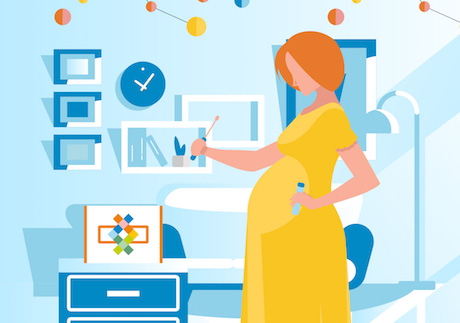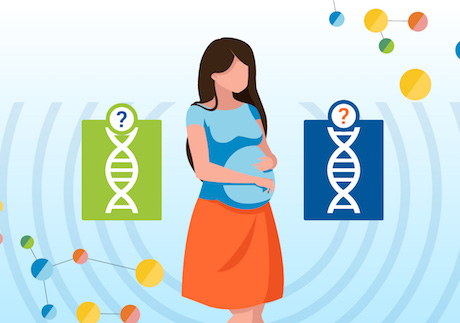By Dr. Brandon Colby MD, a medical expert specializing in genetic testing and personalized medicine.
In this section of the Education Center, we've been discussing the powerful ability we have to perform genetic testing for diseases. This included learning what a genetic disease is and the specific types of diseases that can be detected using genetic testing.
In this article, we'll discuss a special type of genetic testing called prenatal genetic screening, which is performed during pregnancy on a developing fetus.
This article is for women and men who are expecting a child and would like to learn more about genetic testing while pregnant.

What You Need to Know About Genetic Testing During Pregnancy
Congratulations! You're about to welcome a brand new person into the world. If you're like most people, all you want is for your baby to be healthy. This can be one of the scariest things about being pregnant -- the unknown. The good news is that genetic testing during pregnancy is an effective way to help ease your mind.
Different Types of Genetic Testing During Pregnancy
Genetic tests can check babies for the risk of health conditions, such as birth defects and neural tube defects, while they are in the womb. These tests check the baby's DNA for genetic disorders.
It's also possible to check the mother or father to see if either of them have any genetic mutations that could put the baby at increased risk for a genetic disease. This can happen before conception or during pregnancy, but the American College of Obstetricians and Gynecologists recommends doing it before conception.
Prenatal Genetic Screening Tests
Prenatal screening for rare diseases can identify gene mutations that may be passed on to a baby. If a prenatal test identifies the mother as a carrier of a disease, genetic counselors often recommend testing the father to see if he is also a carrier.
While someone can suffer from disease by inheriting a single gene mutation, there's a much higher risk of disease if the person receives two gene mutations for the same disease. This is because there are two genes associated with a disease. If only one is mutated, the unaffected gene can protect the person from the disease by taking on the job of the mutated one.
If carrier screening shows an elevated risk for a genetic disease -- for example, Tay-Sachs --prenatal care may be recommended to lower the risk for the fetus.
Learn More: Carrier Screening
The Benefits of Genetic Tests During Pregnancy
Prenatal genetic testing is a good idea, but just because you're already pregnant, that doesn't mean that you can't seek genetic testing now.
Genetic problems in the way of chromosomal abnormalities can be identified with a DNA test. DNA testing has NO risks. It's not like amniocentesis, in which amniotic fluid is taken, or chorionic villus sampling, in which a piece of tissue is taken from the placenta.
DNA tests are just as effective as other, riskier chromosome testing. A blood test is not needed because a DNA sample can be collected from saliva or a swab of the cheek. The screening test on the DNA happens in two steps.
- The lab pulls raw data from the DNA. This is the unique information contained in the DNA.
- The data is analyzed for mutations related to the diseases of interest, such as cystic fibrosis, Down syndrome, trisomy 18, trisomy 13, or other chromosome abnormalities.
DNA tests can be performed in the first trimester, second trimester, or any of the weeks of pregnancy. The sooner the better, though, because that will allow sufficient time for healthcare providers to discuss treatment options, if needed.
Choosing the Best DNA Tests for Genetic Conditions

Receiving false results on a genetic screening, such as false-positive or false-negative, is not something you want to deal with when it comes to the health of your baby. It's important to seek a test that will give you true results. A drug store, such as CVS, is not the best place to purchase a DNA test.
You also do not have to meet with a geneticist or genetic counselor to get a genetic test. Effective, high-quality genetic tests are available online, but not all of them are created equal.
DNA tests many people know about ,like 23andMe, MyHeritage, and Ancestry.com, are great for basic health and ancestry information. The data from those tests can be used to identify some potential genetic disorders, but they are not comprehensive enough to provide as much information as you need.
This means if you use that data, it may miss some very important genetic diseases that you should know about.
The best genetic testing for genetic diseases is Whole-Genome Sequencing.
Due to advancements in technology, it's possible to sequence your whole genome. What does that mean? It simply means whole genome sequencing can pull out information for tens of thousands of genes. The analysis of those genes is what produces the test results you need for genetic testing during pregnancy.
A whole-genome sequencing report, such as Rare Disease Screen, will show the risk factors of certain diseases from a list of over 1200. If the report shows any high-risk screening results, a follow-up with a genetic counselor or healthcare provider should be done.
Please note: Positive results do not mean you or your baby are destined to suffer from the identified disease. It simply means there's a higher risk. Only diagnostic testing will show whether there is a disease, and diagnostic tests will only show positive results following onset.
Learn more about DNA tests for diseases:
Protecting Yourself and Your Baby from Disease
Pregnant women go through a lot during pregnancy -- worrying about genetic diseases shouldn't be something that makes pregnancy a negative one. First-trimester screening is a common practice, but there's more that can be done with DNA tests. Even if you do not have a family history of genetic diseases, you should still look into genetic testing during pregnancy.
The information obtained from the test results can be relieving or it can be a proactive way to reduce the risk of your baby suffering from a disorder.
Learn more about genetic diseases:
Special Note About Genetic Testing and COVID During Pregnancy
There is evidence that genetics plays a role in contracting COVID and in the severity of the illness. Coronavirus DNA testing is completely safe during pregnancy, so it's worth looking into your genetics and how they relate to COVID-19.
The information you learn can help you increase your protection against the virus. You can also share that information with healthcare professionals if you do contract COVID.
About the Author
Dr. Brandon Colby MD is a US physician specializing in the personalized prevention of disease through the use of genomic technologies. He's an expert in genetic testing, genetic analysis, and precision medicine. Dr. Colby is also the Founder of Sequencing.com and the author of Outsmart Your Genes.
Dr. Colby holds an MD from the Mount Sinai School of Medicine, an MBA from Stanford University's Graduate School of Business, and a degree in Genetics with Honors from the University of Michigan. He is an Affiliate Specialist of the American College of Medical Genetics and Genomics (ACMG), an Associate of the American College of Preventive Medicine (ACPM), and a member of the National Society of Genetic Counselors (NSGC).